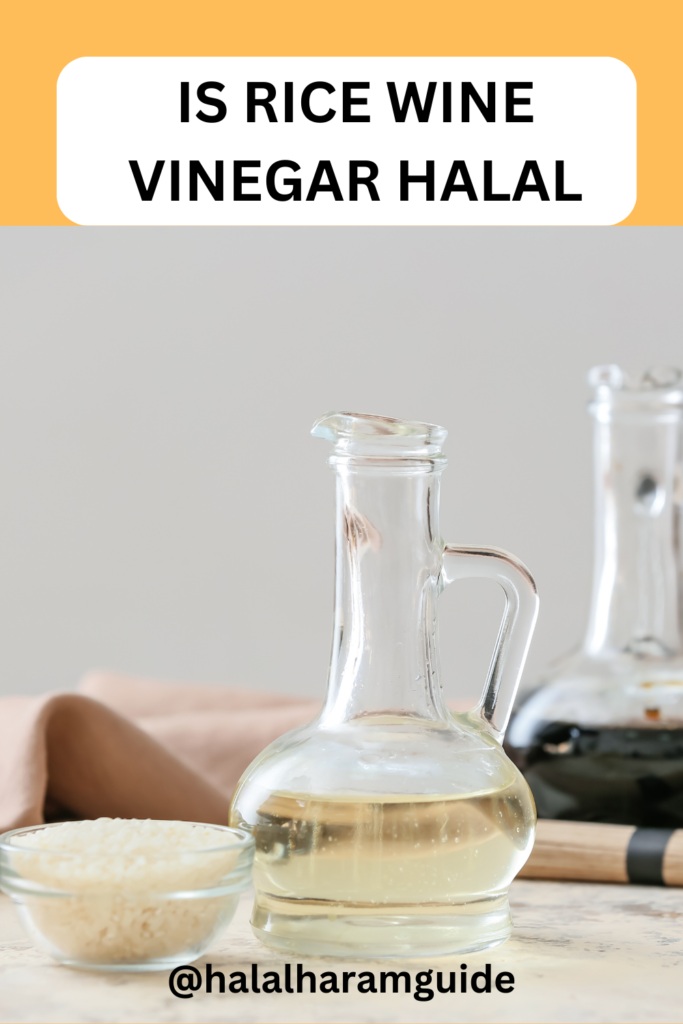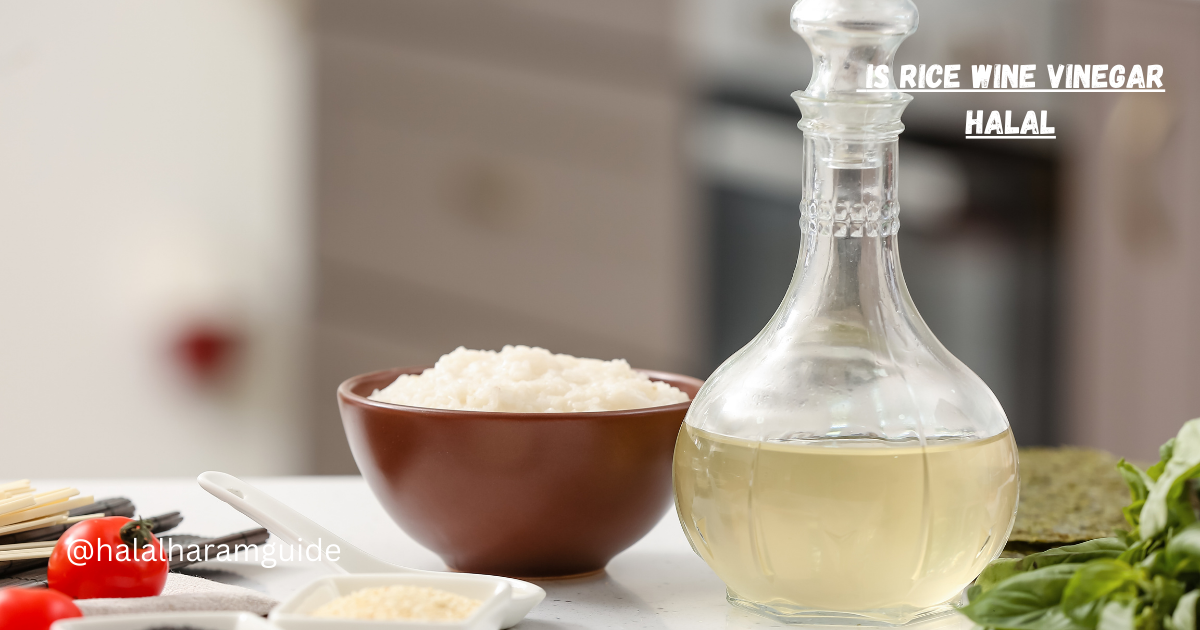Let’s talk about the topic “Is Rice Wine Vinegar Halal”
In the culinary world, rice wine vinegar adds a delightful tang to dishes, making it a popular choice in various cuisines. But for Muslims adhering to halal dietary guidelines, the question often arises: Is rice wine vinegar halal?
In this blog post, we’ll delve into the world of rice wine vinegar, exploring its halal status, the factors to consider, and guidelines for making informed choices in your cooking and dining experiences.
What is Rice Wine Vinegar?
Rice wine vinegar is a type of vinegar that is made from fermented rice wine. It is a staple condiment in many Asian cuisines, particularly in Chinese, Japanese, and Korean cooking. Here’s how rice wine vinegar is produced and some of its key characteristics:
Production:
Fermentation: Rice wine vinegar begins its journey as rice that is fermented into rice wine. The fermentation process involves using yeast to convert the sugars in rice into alcohol.
Acetic Acid Fermentation: After the rice wine has been produced, it undergoes a second fermentation process. In this step, acetic acid bacteria are introduced to the rice wine. These bacteria convert the alcohol in the rice wine into acetic acid, which is the primary component of vinegar and gives it its characteristic tangy flavor.
Key Characteristics:
Flavor: Rice wine vinegar has a mild, slightly sweet, and delicate flavor compared to some other types of vinegar like white or apple cider vinegar. It is less acidic and has a subtler taste profile.
Color: It is typically clear and ranges from colorless to pale yellow.
Acidity: Rice wine vinegar has a moderate acidity level, making it suitable for various culinary applications. It is often used to balance flavors in dressings, marinades, and sauces.
Common Uses:
Culinary Applications: Rice wine vinegar is widely used in Asian cuisine for making sushi rice, salad dressings, dipping sauces, and marinades. It adds a tangy and slightly sweet note to dishes.
Pickling: It is also used in pickling various vegetables and fruits, both in Asian and non-Asian cuisines.
Flavor Enhancer: Some chefs and home cooks use rice wine vinegar as a flavor enhancer, adding a touch of acidity and depth to dishes without overpowering them.
Cleaning: It can also be used for cleaning purposes due to its mild acidity.
Is Rice Wine Vinegar Halal?
Rice wine vinegar, in its pure and unadulterated form, is generally considered halal for Muslim consumption. It is made through the fermentation of rice wine, and the fermentation process typically removes the alcohol content, leaving behind acetic acid, which is the primary component of vinegar.
However, there are a few considerations to keep in mind:
Purity of Ingredients:
Ensure that the rice wine vinegar you are using is made from halal ingredients and does not contain any additives or ingredients that are not permissible in Islamic dietary laws.
Avoid Seasoned Varieties:
Some rice wine vinegar products are “seasoned,” which means they may contain added sugar and salt. Muslims who strictly follow halal dietary guidelines should check the product label to confirm the absence of non-halal ingredients.
Cross-Contamination:
Cross-contamination with non-halal products is always a possibility in food processing facilities. If you are concerned about cross-contamination, you may want to look for rice wine vinegar that is certified as halal by a reputable certifying authority. Halal certification ensures that the product has been produced and processed in accordance with Islamic dietary laws.
Individual Interpretation:
The permissibility of rice wine vinegar may also depend on the interpretation of Islamic dietary laws by individual scholars or religious authorities. Some scholars may have different opinions on whether products like rice wine vinegar are halal, so it can be helpful to consult with a knowledgeable Islamic scholar or authority for specific guidance if you have concerns.
What Does Rice Wine Vinegar Contain?
Rice wine vinegar is made from fermented rice wine, and its primary component is acetic acid, which is responsible for its tangy flavor. The production process of rice wine vinegar typically involves the following key ingredients and steps:
Rice: The main ingredient is rice. Specifically, glutinous or sticky rice is commonly used in the production of rice wine vinegar. The rice is usually steamed or cooked before fermentation.
Yeast: Yeast is added to the cooked rice to ferment the sugars present in the rice. This fermentation step converts the sugars into alcohol, creating rice wine.
Acetic Acid Bacteria: After the rice wine is produced, acetic acid bacteria (Acetobacter) are introduced to the rice wine. These bacteria convert the alcohol in the rice wine into acetic acid through a secondary fermentation process. Acetic acid is the primary component of vinegar and gives it its characteristic sour taste.
Water: Water is often added to the rice wine vinegar to adjust its acidity and achieve the desired flavor profile.
Is Rice Wine Vinegar Different From Sake?
Here are the key differences between rice wine vinegar and sake:
Primary Purpose:
Rice Wine Vinegar: Rice wine vinegar is primarily used as a condiment and cooking ingredient, valued for its acidity and flavor. It is commonly used in salad dressings, marinades, pickles, and various dishes to add a tangy taste.
Sake: Sake, on the other hand, is a Japanese alcoholic beverage made through the fermentation of rice. It is often referred to as “rice wine” due to its appearance and alcohol content. Sake is consumed as a beverage, and its flavor, aroma, and production process are more akin to wine or beer than vinegar.
Fermentation and Alcohol Content:
Rice Wine Vinegar: In the production of rice wine vinegar, rice is initially fermented into rice wine, which contains alcohol. Subsequently, acetic acid bacteria are introduced to convert the alcohol into acetic acid, turning the rice wine into vinegar. Rice wine vinegar has a low alcohol content due to this conversion process.
Sake: Sake is made through a fermentation process that results in a higher alcohol content compared to rice wine vinegar. Sake production involves the conversion of rice starches into alcohol by yeast, and the final product is an alcoholic beverage.
Flavor and Use:
Rice Wine Vinegar: Rice wine vinegar has a tangy and slightly sweet flavor, making it a versatile ingredient in cooking and as a condiment.
Sake: Sake has a wide range of flavors and characteristics, including sweetness, dryness, and varying levels of complexity, depending on the type of sake. It is enjoyed for its unique taste and is often consumed on its own or served with Japanese cuisine.
Does Rice Wine Vinegar Contain Anything Haram?
Rice wine vinegar, in its pure and unadulterated form, typically does not contain any ingredients that are considered haram (forbidden) in Islamic dietary laws. It is primarily made from rice, yeast, and acetic acid bacteria, and the fermentation process generally removes any alcohol content that might have been present in the initial rice wine.
However, there are a few considerations to keep in mind:
Purity of Ingredients: Ensure that the rice wine vinegar you are using is made from halal ingredients and does not contain any additives or ingredients that are not permissible in Islamic dietary laws. Check the product label for a list of ingredients.
Seasoned Varieties: Some commercial varieties of rice wine vinegar, known as “seasoned” rice wine vinegar, may contain added sugar and salt for flavor enhancement. Muslims who strictly follow halal dietary guidelines should check the product label to confirm the absence of non-halal ingredients in these seasoned varieties.
Cross-Contamination: Cross-contamination with non-halal products is always a possibility in food processing facilities. If you are concerned about cross-contamination, you may want to look for rice wine vinegar that is certified as halal by a reputable certifying authority. Halal certification ensures that the product has been produced and processed in accordance with Islamic dietary laws.
Individual Interpretation: The permissibility of rice wine vinegar may also depend on the interpretation of Islamic dietary laws by individual scholars or religious authorities. Some scholars may have different opinions on whether products like rice wine vinegar are halal, so it can be helpful to consult with a knowledgeable Islamic scholar or authority for specific guidance if you have concerns.
Is there a concept in islam about rice wine Vinegar?
In Islam, there is no specific concept or prohibition related to rice wine vinegar (or vinegar in general) as long as it meets certain criteria in accordance with Islamic dietary laws. Rice wine vinegar, like other types of vinegar, is made through a fermentation process that converts alcohol into acetic acid, which is the primary component of vinegar.
Since alcohol is prohibited in Islam, it is essential that the fermentation process completely transforms the alcohol into acetic acid, rendering the final product non-alcoholic. As long as rice wine vinegar is produced and verified to be free from alcohol and any non-halal additives or ingredients, it is generally considered permissible (halal) for Muslim consumption.
Muslims are encouraged to exercise caution, read product labels, and seek reputable halal certification when in doubt to ensure that the vinegar conforms to Islamic dietary guidelines.
Conclusion
In conclusion, rice wine vinegar is generally considered halal for Muslim consumption, as long as it is produced in a manner that eliminates any alcohol content during fermentation and does not contain any haram (forbidden) ingredients or additives.
Muslims can use rice wine vinegar in cooking and as a condiment while adhering to Islamic dietary guidelines. However, it’s advisable to exercise caution, read product labels, and seek reputable halal certification when in doubt about the specific product’s compliance with halal standards.
(FAQs)
1. Is Chinese Rice Vinegar Halal?
Chinese rice vinegar can be halal if it is produced in a manner that ensures it does not contain any haram (forbidden) ingredients or additives and if the alcohol content, which may be present during the fermentation process, is completely transformed into acetic acid, making the final product non-alcoholic.
2. Is White Rice Vinegar Halal?
White rice vinegar, like other types of rice vinegar, can be halal if it meets the criteria mentioned earlier. It should be produced in a way that eliminates any alcohol content and does not contain any haram ingredients or additives.
As with Chinese rice vinegar, it’s essential to review the product label and seek halal certification or guidance when in doubt about the specific brand or type of white rice vinegar.
3. Is White Rice Vinegar Halal As Per Hanafi?
The permissibility of white rice vinegar, or any vinegar, according to the Hanafi school of Islamic jurisprudence (fiqh), generally follows the same principles as other Islamic schools of thought. In the Hanafi school, vinegar is considered permissible as long as it is not produced from grapes or dates, which are considered haram sources for vinegar due to their use in winemaking.
Is there alcohol in rice wine vinegar?
Rice wine vinegar, like other types of vinegar, is typically made through a fermentation process that involves converting alcohol into acetic acid. Therefore, while alcohol may be present during the initial stages of fermentation, the end product, which is the vinegar, should not contain any significant amount of alcohol.
Can Muslims have wine vinegar?
In Islamic dietary laws, the consumption of alcoholic beverages is strictly prohibited (haram). However, when it comes to vinegar, including wine vinegar, Islamic jurisprudence generally makes an exception. Vinegar that is produced from an alcoholic beverage (such as wine) is considered permissible (halal) for Muslims to consume if the following conditions are met:
- “Is Lobster Halal? Understanding Its Permissibility”
- “Is Drawing Haram in Islam? Understanding the Perspective”
- “Is Fermented Kimchi Halal? Exploring Kimchi’s Halal Status”
- “Is Collagen Halal? Unveiling the Halal Status of Collagen”
- “Is Wine Vinegar Halal? Unveiling Its Permissibility”


